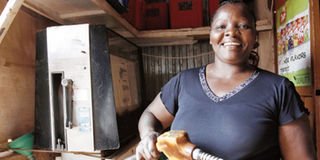Populist plan to leave tax waivers on food intact

Ms Linah Manka Keruku at her shop in Kasarani, Nairobi on June 14, 2012. She is happy with this year’s budget proposals that left fuel and food tax waivers intact. Photo/STEPHEN MUDIARI
Sunset is drawing and Josephine Wanjiku is worried. She has no food in the house. Her two children will be coming home soon. Dinner will be late.
She has spent the last of her money paying her rent, 10 days late. A month ago, the landlord raised it to Sh1,500 and now she can only pay it in instalments. Read (Cost of living too high, says tailor)
“This house costs too much, I don’t think I can live here much longer,” she says glancing around the one-roomed apartment in Githurai 44.
Wanjiku is a widow. She supports her son and daughter by selling tissue paper and small snacks at a roadside market.
When this money does not meet the expenses, she works as a laundry woman in some of the upcoming middle class neighbourhoods on Thika Road.
Her situation may get more dire. In his budget speech on Thursday, Finance Minister Njeru Githae announced a decision to tighten the taxman’s noose around categories of income earners that have thus far not been paying taxes.
Landlords are at the top of this hit list. Therefore, there is a strong possibility that the rent on Ms Wanjiku’s home will go up as the landlord passes on costs to the tenant, once the Kenya Revenue Authority starts the new taxation measures.
For Abdalla Abdulrahman’s family in Kisauni, the landlord-tax question is reversed.
The family rents out their makuti-thatched Swahili houses for about Sh350 a day to supplement their income.
This translates to Sh10,500 on a good month — enough to catch the tax-man’s eye.
“If they tax landlords, I hope that it is fair and that we can see the impact of our money,” he said.
However, families do have a reason to heave a sigh of relief. Despite the new tax measures on landlords, Githae presented a relatively populist budget favouring the mwananchi.
Lina Karuku’s family manages a small supermarket in Kasarani. She sells basic commodities and kerosene.
Her one request of the government, she told the Nation on the eve of the budget speech, was for the prices of these commodities to remain constant or to go down.
“We feed of this duka. People are already buying less because the cost of living is so high. If any new taxes are introduced, we don’t know what we will do,” she said.
For Wanjiku, higher food prices may tip the balance on her already precarious family budget.
“Life is already too hard. I want the government to make sure prices drop,” she told the Nation as beads of sweat broke out on her brow and her eyes took on a tellingly glistening sheen.
They got half of their wish. Githae’s budget left duty waivers of kerosene, the main fuel source in her house, intact. Foodstuff such as wheat and maize were also untouched.
Last year, Wanjiku spent one month in hospital suffering from a chest complication she could not pay for. She had to rely on contributions from family and friends.
With the great emphasis that the minister placed on ensuring that health services are affordable and available to all Kenyans, there is hope in the horizon that she could pay for hospital visits.
For the Abdulrahmans, education is the main cause of worry. Abdulrahman has six children.
His daughter, Thurea, is currently out of school as he tries to save enough money for a Sh1,700 school levy.
His other children have completed secondary school but are yet to go to university.
The budget made broad educational provisions for children coming from poor and needy families.
Sh1.1 billion has been set aside for a bursary program while Sh118.7 billion will be set aside to recruit new teachers.




